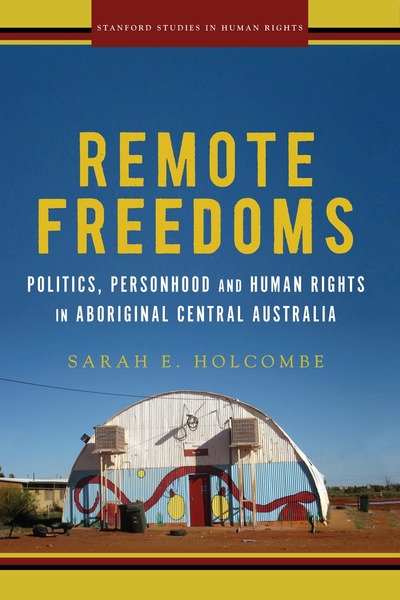
2018
384 pages.
from $35.00
Paperback now $17.50 (50% off)
Hardcover ISBN: 9781503605107
Paperback ISBN: 9781503606470
Ebook ISBN: 9781503606487
What does it mean to be a "rights-holder" and how does it come about? Remote Freedoms explores the contradictions and tensions of localized human rights work in very remote Indigenous communities.
Based on field research with Anangu of Central Australia, this book investigates how universal human rights are understood, practiced, negotiated, and challenged in concert and in conflict with Indigenous rights. Moving between communities, government, regional NGOs, and international UN forums, Sarah E. Holcombe addresses how the notion of rights plays out within the distinctive and ambivalent sociopolitical context of Australia, and focusing specifically on Indigenous women and their experiences of violence. Can the secular modern rights-bearer accommodate the ideals of the relational, spiritual Anangu person? Engaging in a translation of the Universal Declaration of Human Rights into the local Pintupi-Luritja vernacular and observing various Indigenous interactions with law enforcement and domestic violence outreach programs, Holcombe offers new insights into our understanding of how the global rights discourse is circulated and understood within Indigenous cultures. She reveals how, in the postcolonial Australian context, human rights are double-edged: they enforce assimilation to a neoliberal social order at the same time that they empower and enfranchise the Indigenous citizen as a political actor. Remote Freedoms writes Australia's Indigenous peoples into the international debate on localizing rights in multicultural terms.
About the author
Sarah E. Holcombe is Senior Research Fellow at the University of Queensland and a Visiting Fellow at the Australian National University.
"A vibrant, thoughtful analysis of the political and gendered experiences of indigenous rights, human rights, and citizenship among aboriginal communities in Australia. Remote Freedoms draws on Holcombe's years of research to offer accessible, nuanced engagements with anthropological theories of personhood, translation, politics, and justice."
—Dorothy L. Hodgson, Rutgers University
"Australia has an ambivalent approach to human rights, especially regarding Aboriginal peoples. This highly-readable book brings a fresh perspective. Contrasting legal and rights approaches, Holcombe examines how Aboriginal women experiencing violence resist victimhood, but have few alternatives to change their circumstances. The national political context which frames the focus on Central Australia makes it all the more compelling."
—Gaynor Macdonald, University of Sydney
"Holcombe's achievement is to make it clearer to outsiders what is at stake as Anangu dialogue, among themselves and with outsiders, about experiments in reconciling human rights principles and vernacular notions of social justice."
—Timothy Rowse, Oceania